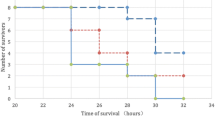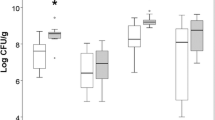Abstract
Background
Cardiopulmonary bypass (CPB) is commonly applied to support circulation during heart surgery but frequently causes adverse effects.
Aims
The purpose of this study was to examine the potential of probiotics to improve small intestinal mucosa barrier function after CPB.
Methods
Twenty-four adult male SD rats were randomly divided into sham-operated (S), CPB-operated (CPB), and probiotic-fed (Y) groups. Diamine oxidase (DAO) activity and concentrations of D-lactic acid, endotoxin, TNFα, and IL-6 were measured in portal vein blood. IgA concentrations were determined in plasma and the small intestine. Vena cava blood and tissue samples were used to monitor bacterial growth. Intestinal epithelial ultrastructure was analyzed by transmission electron microscopy (TEM). Occludin and ZO-1 expression levels in the intestinal epithelium were detected by western blotting and immunohistochemistry, respectively.
Results
D-lactic acid, endotoxin, TNFα and IL-6 levels, DAO activity, and bacterial translocation rate were increased (P < 0.05) in CPB and Y compared to the S group. The above indices were relatively lower (P < 0.05) in Y than in CPB. Plasma and small intestinal IgA levels were significantly lower (P < 0.05) in CPB, while in Y they were significantly increased (P < 0.05) but lower than in S (P < 0.05). These results were confirmed by TEM. Consistently, occludin and ZO-1 expression levels were significantly higher in Y than in CPB (P < 0.05) but still lower compared to S (P < 0.05).
Conclusion
Pre-administration of probiotics can improve, to some extent, intestinal barrier function after CPB in rats, and this effect is likely related to inhibition of the CPB-induced inflammatory response, improvement in local intestinal immune function, and increased expression of intestinal epithelial tight junction proteins.






Similar content being viewed by others
References
Riddington DW, Venkatesh B, Boivin CM, et al. Intestinal permeability, gastric intramucosal pH, and systemic endotoxemia in patients undergoing cardiopulmonary bypass. JAMA. 1996;275:1007–1012.
Hamilton-Davies C, Barclay GR, Cardigan RA, et al. Relationship between preoperative endotoxin immune status, gut perfusion, and outcome from cardiac valve replacement surgery. Chest. 1997;112:1189–1196.
Mojcik CF, Levy JH. Aprotinin and the systemic inflammatory response after cardiopulmonary bypass. Ann Thorac Surg. 2001;2:745–754.
Thoren A, Nygren A, Houltz E, et al. Cardiopulmonary bypass in humans jejunal perfusion increases in parallel with well-maintained microvascular hematocrit. Acta Anaesthesiol Scand. 2005;49:502–509.
Sack FU, Reidenbach B, Schledt A, et al. Dopexamine attenuates microvascular perfusion injury of the small bowel in pigs induced by extracoporeal circulation. Anaesthesia. 2002;88:841–847.
Salvatore S, Hauser B, Vandenplas Y. Chronic enteropathy and feeding. Nestle Nutr Workshop Ser Pediatr Program. 2007;59:115–126.
Wang B, Huang Q, Zhang W, et al. Lactobacillus plantarum prevents bacterial translocation in rats following ischemia and reperfusion injury. Dig Dis Sci. 2011;56:3187–3194.
Patel RM, Lin PW. Developmental biology of gut-probiotic interaction. Gut Microbes. 2010;1:186–195.
Lievin V, Peiferl, Hudault S, et al. Bifidobacterium strains from resident infant human gastrointestinal microflora exert antimicrobial activity. Gut. 2000;47:646–652.
Asahara T, Shimizu K, Nomoto K, et al. Probiotic bifidobacteria protect mice from lethal infection with Shiga toxin producing Escherichia coli l57:H7. Infect Immun. 2004;72:2240–2247.
Collado MC, Gueimonde M, Hernández M, et al. Adhesion of selected Bifidobacterium strains to human intestinal mucus and the role of adhesion in enteropathogen exclusion. J Food Prot. 2005;68:2672–2678.
Mochizuki H, Trocki O, Dominioni L, et al. Mechanism of prevention of postburn hypermetabolism and catabolism by early enteral feeding. Ann Surg. 1984;200:297–310.
Haller D, Antoine JM, Bengmark S, et al. Guidance for substantiating the evidence for beneficial effects of probiotics: probiotics in chronic inflammatory bowel disease and the functional disorder irritable bowel syndrome. J Nutr. 2010;140:690–697.
Sun YJ, Chen WM, Zhang TZ, et al. Effects of cardiopulmonary bypass on tight junction protein expressions in intestinal mucosa of rats. World J Gastroenterol. 2008;14:5869.
Fürst W, Schiesser A. Test for stereospecifity of an automated D-lactate assay based on selective removal of Ll-lactate. Anal Biochem. 1999;269:214–215.
Gareau MG, Sherman PM, Walker WA. Probiotics and the gut microbiota in intestinal health and disease. Nat Rev Gastroenterol Hepatol. 2010;7:503–514.
Sanz Y, Nadal I, Sánchez E. Probiotics as drugs against human gastrointestinal infections. Recent Pat Antiinfect Drug Discov. 2007;2:148–156.
Ait-Belgnaoui A, Durand H, Cartier C, et al. Prevention of gut leakiness by a probiotic treatment leads to attenuated HPA response to an acute psychological stress in rats. Psychoneuroendocrinology. 2012;37:1885–1895.
Deng W, Dong XF, Tong JM, et al. The probiotic Bacillus licheniformis ameliorates heat stress-induced impairment of egg production, gut morphology, and intestinal mucosal immunity in laying hens. Poult Sci. 2012;91:575–582.
Lutgendorff F, Akkermans LM, Söderholm JD. The role of microbiota and probiotics in stress-induced gastro-intestinal damage. Curr Mol Med. 2008;8:282–298.
Bhatia V, Tandon RK. Stress and the gastrointestinal tract. J Gastroenterol Hepatol. 2005;20:332–339.
Mogilner JG, Srugo I, Lurie M, et al. Effect of probiotics on intestinal regrowth and bacterial translocation after massive small bowel resection in a rat. J Pediatr Surg. 2007;42:1365–1371.
Tsunooka N, Maeyama K, Nakagawa H, et al. Localization and changes of diamine oxidase during cardiopulmonary bypass in rabbits. J Surg Res. 2006;131:58.
Johnson SD, Smye M, Watson RP. Intestinal permeability tests in celiac disease. Clin Lab. 2001;47:143.
Adawi D, Ahrne S, Molin G. Effects of different probiotic strains of Lactobacillus and bifido-bacterium on bacterial translocation and liver injury in an acute liver injury model. Int J Food Microbiol. 2001;70:213–220.
Schroeder B, Duncker S, Barth S. Preventive effects of the probiotic Escherihia on acute secretory diarrhea in a pig model of intestinal infection. Dig Dis Sci. 2006;51:724–731.
Cole CR, Frem JC, Schmotzer B, et al. The rate of bloodstream infection is high in infants with short bowel syndrome: relationship with small bowel bacterial overgrowth, enteral feeding and inflammatory and immune responses. J Pediatr. 2010;156:941–947.
Woodcock NP, Robertson J, Morgan DR, et al. Bacterial translocation and immunohistochemical measurement of gut immune function. J Clin Pathol. 2001;54:619–623.
Mantis NJ, Forbes SJ. Secretory IgA: arresting microbial pathogens at epithelial borders. Immunol Invest. 2010;39:383–406.
Ljungdahl M, Lundholm M, Katouli M, et al. Bacterial translocation in experimental shoch is dependent in the intestinal flora. Scand J Gastroenterol. 2000;35:3892–3971.
Braniste V, Jouault A, Gaultier E, et al. Impact of oral bisphenol A at reference doses on intestinal barrier function and sex differences after perinatal exposure in rats. Proc Natl Acad Sci USA. 2010;107:448–453.
Ebnet K, Aurrand-ions M, Kuhn A, et al. The junctional adhesion molecule (JAM) family members JAM-2 and JAM23 associate with the cell polarity protein PAR-3: a possible role for JAM sin endothelial cell polarity. J Cell Sci. 2003;116:3879–3891.
Resta-Lenert S, Barrett KE. Live probiotics protect intestinal epithelia cells from the effects of infection with enteroinvasive Escherichia col (EIEC). Gut. 2003;52:988–9971.
Dai C, Guandalini S, Zhao DH, Jiang M. Antinociceptive effect of VSL#3 on visceral hypersensitivity in a rat model of irritable bowel syndrome: a possible action through nitric oxide pathway and enhance barrier function. Mol Cell Biochem. 2012;362:43–53.
Daxin Cheng, Qixiang Shen, Limin Chen, et al. Effects prolonged extracorporeal circulation on metabolism. Chin J ECC. 2005;3:44–46.
Land MH, Rouster-Stevens K, Woods CR, et al. Lactobacillus sepsis associated with probiotic therapy. Pediatrics. 2005;1l5(1):178–181.
D’Aimmo MR, Modesto M, Biavati B. Antibiotic resistance of lactic acid bacteria and Bifidobacterium spp. isolated from dairy and pharmaceutical products. Int J Food Microbiol. 2007;115(1):35–42.
Acknowledgments
This work was supported by a grant from the Doctor Priming Foundation of Liaoning Province (20091099).
Conflict interest
None.
Author information
Authors and Affiliations
Corresponding author
Rights and permissions
About this article
Cite this article
Sun, YJ., Cao, HJ., Song, DD. et al. Probiotics Can Alleviate Cardiopulmonary Bypass-Induced Intestinal Mucosa Damage in Rats. Dig Dis Sci 58, 1528–1536 (2013). https://doi.org/10.1007/s10620-012-2546-0
Received:
Accepted:
Published:
Issue Date:
DOI: https://doi.org/10.1007/s10620-012-2546-0




